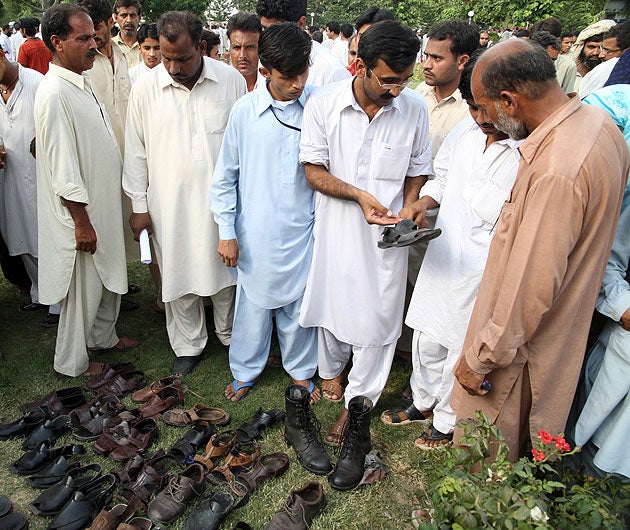The Taliban have claimed responsibility for the twin suicide bombings at a weapons factory near the Pakistani capital Islamabad which have left at least 46 people dead and 70 others wounded.
The ruling coalition government — made up of traditional rivals who were united primarily in their determination to force Musharraf from office — meanwhile appeared veering toward collapse.
The two main parties have been unable to bridge key differences, like whether judges fired by the one-time military ruler should be quickly reinstated and who should succeed him as president.
Pakistanis have urged the civilian government to stop bickering and turn quickly to tackling the country's problems, like a deepening economic crisis and extremist violence, especially in the volatile northwest.
Two suicide bombers struck a government arms factory 35 kilometers (20 miles) west of Islamabad just as many workers were heading home from the factory Thursday, said local police chief Nasir Durrani.
Hospital official Mohammed Azhar said 46 people died in the attack and 70 others were wounded, some of them critically. Security officials said the death toll would likely rise.
Rana Tanveer, who was working at a bank about 200 meters (yards) from one of the gates where a bomber struck, said he was among the first to reach the scene.
"All around the gate I saw blood and human flesh. People helped the injured and took them in their cars and even on motorbikes to the hospital," he said. "Seven or eight people were already dead and another 10 people were breathing their last."
The factory lies on the road into Pakistan's troubled northwest, where fighting between security forces and Islamic militants has escalated in recent weeks. Militants have repeatedly threatened to restart a bombing campaign that raged across the country last year unless the army pulls back.
Musharraf, who had been a key supporter of the U.S. war on terrorism, resigned Monday to dodge the humiliation of impeachment following nearly nine years in power.
The coalition government, meanwhile, has plunged back into a struggle over how to restore dozens of Supreme Court judges Musharraf sacked last year to avoid legal challenges to his rule.
The maneuver deepened his unpopularity, propelling his rivals to victory in parliamentary elections five months ago, and turned the judges into controversial political figures.
Former Prime Minister Nawaz Sharif's party threatened Thursday to leave the ruling coalition unless the judges were quickly reinstated and the coalition's biggest bloc, the Pakistan People's Party, appeared to be lining up smaller parties to keep control of parliament in case that happened.
"The future of this coalition is linked to the restoration of judges," Sharif's spokesman Sadiqul Farooq told The Associated Press. "If the judges are not restored, we will prefer to sit on opposition benches."
Sharif wants to restore the all the justices, who could help him if he decides to seek revenge against Musharraf, who ousted the former premier in a 1999 coup, jailed him and then banished him to exile in Saudi Arabia.
But Asif Ali Zardari, the leader of the Pakistan People's Party, is less enthusiastic. He has accused former chief justice Iftikhar Mohammed Chaudhry of being too political.
Analysts say he also may be worried the former chief justice would revive corruption cases against him or facilitate legal action against Musharraf — a destabilizing move sure to dismay the country's Western backers, especially the United States.
The People's Party said Thursday it was committed to restoring the judges but that it had other priorities as well, including improving the lives of ordinary Pakistanis who are struggling with chronic food and fuel shortages.
"We hope the coalition will not break," Farzana Raja, the ruling party's spokeswoman told Pakistani Waqt news channel.
The coalition also must seek agreement on a candidate for the presidency. The new leader must be elected by lawmakers by mid-September.
The People's Party insisted this week that, as the largest party in the coalition, it has the right to choose the new head of state, something unlikely to go over well with Sharif.
Though they have yet to name a candidate, party members were talking up a candidacy for Zardari, who comes from the well-off southern province of Sindh.
Sharif's party was arguing for a president from one of the smaller province — Baluchistan or North West Frontier — in order to strengthen Pakistan's strained federation.

Join our commenting forum
Join thought-provoking conversations, follow other Independent readers and see their replies
Comments